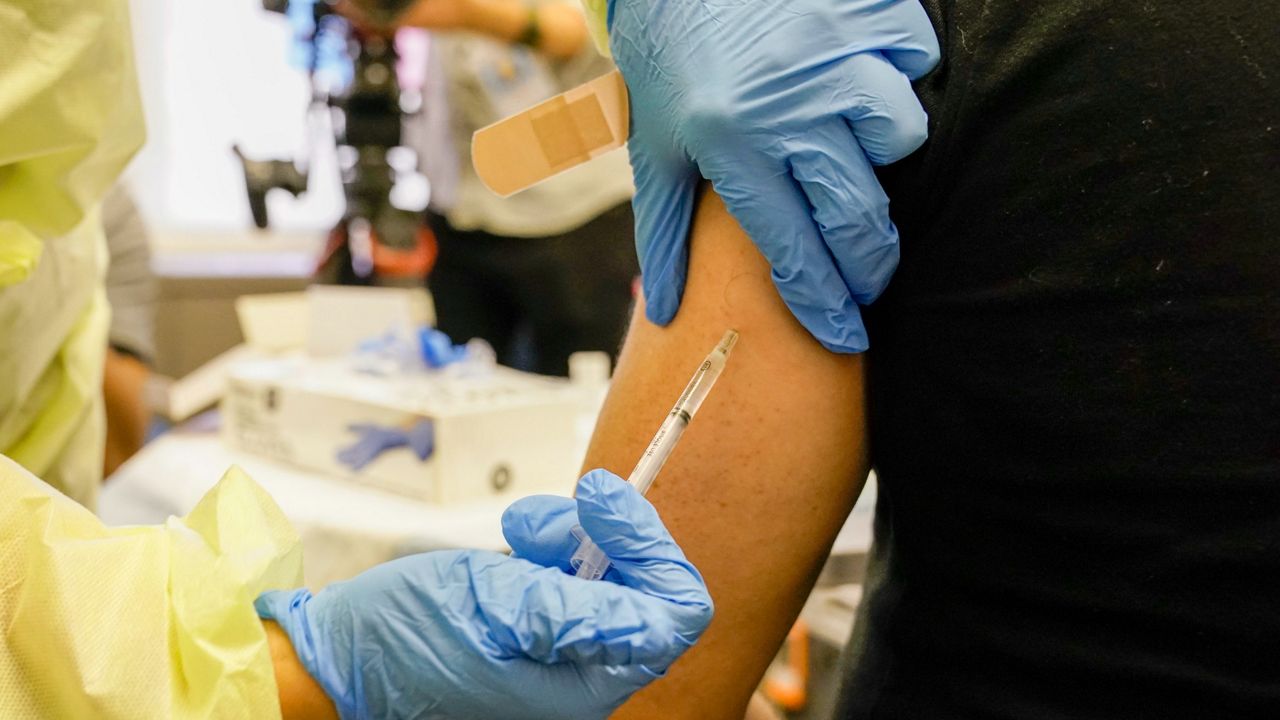New York City will stretch out its limited monkeypox vaccine supply using a method that allows health care providers to administer smaller doses, the city’s top health official said Wednesday.
The city is rolling out the new vaccine strategy at the behest of the federal government, the five boroughs’ health commissioner, Dr. Ashwin Vasan, said at a City Council hearing Wednesday morning.
More than 12,000 first-dose appointment slots will hit the city’s monkeypox vaccine portal at 6 p.m. on Wednesday, the Department of Health and Mental Hygiene said Tuesday.
What You Need To Know
- More than 12,000 first-dose monkeypox vaccine appointments slots will hit the city's vaccine portal at 6 p.m. on Wednesday
- Almost all of those doses will be administered "intradermally," a method that allows health care providers to administer smaller doses
- The city is rolling out the new vaccine strategy at the behest of the federal government, which still has a limited supply of the Jynneos monkeypox vaccine
Almost all of those doses will be administered “intradermally,” Vasan said.
“A traditional vaccine that most of you have had for different causes is delivered through the subcutaneous tissue,” the commissioner explained. “Which means usually in a place with a lot of tissue around it — a thigh, a buttock, an arm — [using] a longer needle that gets down below the fat underneath the skin, and into and around the subcutaneous tissue beyond it.”
An intradermal vaccine, meanwhile, is delivered “just underneath the skin,” creating a small bubble known as a “bleb” or a “wheel,” he said. As the fat underneath the skin absorbs the dose, it creates a “similar immune response” to that of a subcutaneous dose.
While a subcutaneous dose requires one full vaccine vial, an intradermal dose only requires one-fifth of a vial, Vasan noted.
The U.S. Food and Drug Administration authorized emergency use of the intradermal injection method earlier this month, and the Biden administration is now requiring its use amid an ongoing shortage of the Jynneos monkeypox vaccine, the city’s health department said Tuesday.
Since the federal government issued the mandate, however, some medical professionals have voiced doubts about the efficacy of splitting up doses.
Asked by Councilwoman Lynn Schulman, who chairs the City Council’s health committee, whether the lower dosage would constitute “inferior [medical] treatment,” Vasan on Wednesday said that was not the case.
“We see the immune response, in terms of the number of antibodies produced, seems to be quite similar,” he said. “And so this is a promising strategy to expand supply.”
Schulman also expressed concerns about the city’s ability to train providers to administer intradermal injections, which are usually reserved for procedures like tuberculosis skin tests.
Vasan acknowledged that he himself had not administered an intradermal dose “since medical school.”
“Yes, it is a technical issue. Is it difficult to do? I’m not sure it’s difficult to do, but it will take training, it will take time,” he said. “And our health department staff are out there in the field working with providers.”
“It will take some weeks to get to 100% intradermal,” he added. “But the federal government has made it clear that we won’t get more vaccine until we make the switch.”
Once the health department has transitioned to intradermal injections, it will shift its focus to rolling out second-dose vaccines, Vasan said. The department ordered 9,600 Jynneos vaccine vials last week and 10,000 vials this week, the commissioner said.
“Currently, we hope to learn enough this week from the launch of those intradermal appointments to be able to make some announcements in the next several weeks around when the first tranche of second doses could occur,” he said.
A single dose of the Jynneos vaccine, however, “actually confers significant immune protection,” Vasan noted, adding that a “second dose, delivered up to a year later, actually makes that protection durable.”
As of Wednesday, New York City was reporting 2,810 monkeypox cases. At a New York City Board of Health meeting on Tuesday, Vasan said the five boroughs had seen a “pretty steep decline in our epidemic curve” in recent weeks due in part to their vaccine rollout.
In an interview with NY1 on Wednesday, Dr. Denis Nash, a professor of epidemiology at the CUNY School of Public Health, said he believed intradermal injections would be “as effective” at preventing monkeypox as subcutaneous ones.
“More people will be essentially vaccinated,” Nash said. “So I think it’s an important strategy to get more reach, [to] those most at risk, [rather] than waiting for more doses to deliver subcutaneously.”
“My sense is the only downside is that people that are delivering the vaccine are not adequately trained to do it in the right way,” he added, echoing Schulman’s concerns. “So people need to be trained up to do it properly. But to me, that’s doable. And, I think, worth the benefit.”



